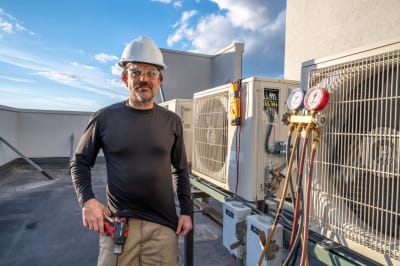To get started in solar technology, an aspiring solar technician in Florida must first understand what the job entails and what their duties are going to be. From there, they can start to concern themselves with the basic educational requirements and certification options.
All of these and more are what we discuss in the upcoming sections below.
We start with the broad steps involved in creating a career as a solar technician before moving on to the educational requirements, top programs in the area to consider, and of course, potential salary to look forward to.
By the time you finish this article, you should have all the information you need to make your journey toward becoming a solar technician in Florida as smooth and straightforward as possible.
How to Become a Solar Technician in Florida
High School Diploma and GED
Possessing a high school diploma or GED is one of the most fundamental requirements for becoming a solar technician in Florida. Those already considering a solar technology career from High School may get themselves ready by taking classes in Mathematics and science.
Shop classes and computer-related classes also help immensely.
Educational Pathways
Solar technicians in Florida often start their careers while going through one of two educational pathways. We take a look at both of these below.
Completing an apprenticeship
Becoming a solar technician in Florida is possible by completing an apprenticeship program. These programs last a few months and include much hands-on training. Along with working in a workshop simulating real-world scenarios, solar technicians in apprenticeship programs also get to go out into the real world and experience how actual installation projects work.
Colleges and Technical Schools
Another alternative to completing an apprenticeship program is to spend a few years in a college or technical program. These programs usually last 1 to 2 years and are great for acquiring the theoretical foundation and practical skills needed on the job.
Formal training programs include science, technology, engineering, and mathematics classes.
Advanced Education
Lastly, even though it is not mandatory, solar technicians in Florida may also consider advancing their education by pursuing bachelor’s degrees in renewable energy, system design, solar technology, and more.
Certification is another way to improve yourself as a solar technician.
Consider Trades with Similar Paths:
Top Solar Technician Schools in Florida
As promised, the following are some of the most notable solar technician schools in Florida:
Florida Solar Energy Apprenticeship Program
Cocoa, FL Online + Campus
The Florida Solar Energy Apprenticeship Program is one of the premier destinations for high-quality solar technology training in Florida. The program is registered with the US Department of Labor and has enjoyed approval from the Florida Department of Education since February 2022.
Tuition
FreeContact
(321) 638-1004
dbessette1@gmail.com
Florida International Training Institute
Miami, FL Online + Campus
Florida International Training Institute brings up qualified solar technicians through its Photovoltaic Design and Installation course. The course is perfect for securing certification from the North American Board of Certified Energy Practitioners.
Tuition
Call for DetailsContact
(305) 594-3151
info@fitischools.com
Indian River State College
Fort Pierce, FL Online + Campus
Indian River State College in Fort Pierce, Florida, has an Electronics Engineering Technology degree program that includes many instructions on solar energy systems.
Tuition
$2,764 - $10,201Contact
(772) 462-4772
info@irsc.edu
Explore Solar Technician Schools by City:
Licensure Requirements
For solar technicians in Florida, the licensing body to pay attention to are the Construction Industry Licensing Board (CILB) and the Electrical Contractors Licensing Board. Some of the licenses to consider include the CV - Certified Solar Contractor license, CW - Residential Solar Water Heating Specialty Contractor license, EC - Electrical Contractors License, and the CR, RP license for limited solar water and pool heaters installation within particular jurisdictions.
While a license is mandatory, certification is not. Still, solar technicians in Florida may consider the North American Board of Certified Energy Practitioners certifications or the Electronics Technicians Association certifications for more career opportunities.
Salary and Job Outlook
Solar Technicians in Florida enjoy an annual average salary of $45,930, provided they fall in the middle of certain optimizable factors such as location, experience, credentials, and more.
Consequently, it is possible to earn below or above this figure. For instance, solar technicians in Florida who fall into the top 10% of earners can make as much as $71,839 in average salary every year. Those who fall into the bottom 10% may take home closer to a $29,365 average salary per year.
Regardless of which bracket they fall, solar technicians in Florida can look forward to a favorable growth potential, seeing as the Bureau of Labor Statistics predicts a 27% jump in demand for professionals in the field between 2021 to 2031.





